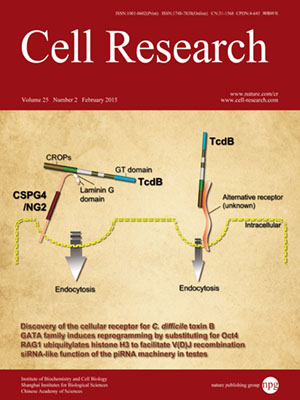
Volume 25, No 2, Feb 2015
ISSN: 1001-0602
EISSN: 1748-7838 2018
impact factor 17.848*
(Clarivate Analytics, 2019)
Volume 25 Issue 2, February 2015: 169-180
ORIGINAL ARTICLES
GATA family members as inducers for cellular reprogramming to pluripotency
Jian Shu1,*, Ke Zhang1,2,*, Minjie Zhang3,4,*, Anzhi Yao1, Sida Shao1, Fengxia Du3, Caiyun Yang3, Wenhan Chen1, Chen Wu1, Weifeng Yang5, Yingli Sun3 and Hongkui Deng1,6,7
1The MOE Key Laboratory of Cell Proliferation and Differentiation, College of Life Sciences, Peking-Tsinghua Center for Life Sciences, Peking University, Beijing 100871, China
2Academy for Advanced Interdisciplinary Studies, Peking University, Beijing 100871, China
3Key Laboratory of Genomic and Precision Medicine, Beijing Institute of Genomics, Chinese Academy of Sciences, Beijing 100101, China
4University of Chinese Academy of Sciences, Beijing 100049, China
5Beijing Vitalstar Biotechnology Co., Ltd., Beijing 100012, China
6Shenzhen Stem Cell Engineering Laboratory, Key Laboratory of Chemical Genomics, Peking University Shenzhen Graduate School, Shenzhen, Guangdong 518055, China
7Peking University Stem Cell Research Center, Department of Cell Biology, School of Basic Medical Sciences, Peking University Health Science Center, Beijing 100191, China
Correspondence: Hongkui Deng, E-mail: hongkui_deng@pku.edu.cn; Yingli Sun,(sunyl@big.ac.cn)
Members of the GATA protein family play important roles in lineage specification and transdifferentiation. Previous reports show that some members of the GATA protein family can also induce pluripotency in somatic cells by substituting for Oct4, a key pluripotency-associated factor. However, the mechanism linking lineage-specifying cues and the activation of pluripotency remains elusive. Here, we report that all GATA family members can substitute for Oct4 to induce pluripotency. We found that all members of the GATA family could inhibit the overrepresented ectodermal-lineage genes, which is consistent with previous reports indicating that a balance of different lineage-specifying forces is important for the restoration of pluripotency. A conserved zinc-finger DNA-binding domain in the C-terminus is critical for the GATA family to induce pluripotency. Using RNA-seq and ChIP-seq, we determined that the pluripotency-related gene Sall4 is a direct target of GATA family members during reprogramming and serves as a bridge linking the lineage-specifying GATA family to the pluripotency circuit. Thus, the GATA family is the first protein family of which all members can function as inducers of the reprogramming process and can substitute for Oct4. Our results suggest that the role of GATA family in reprogramming has been underestimated and that the GATA family may serve as an important mediator of cell fate conversion.
10.1038/cr.2015.6
FULL TEXT | PDF
Browse 2495


